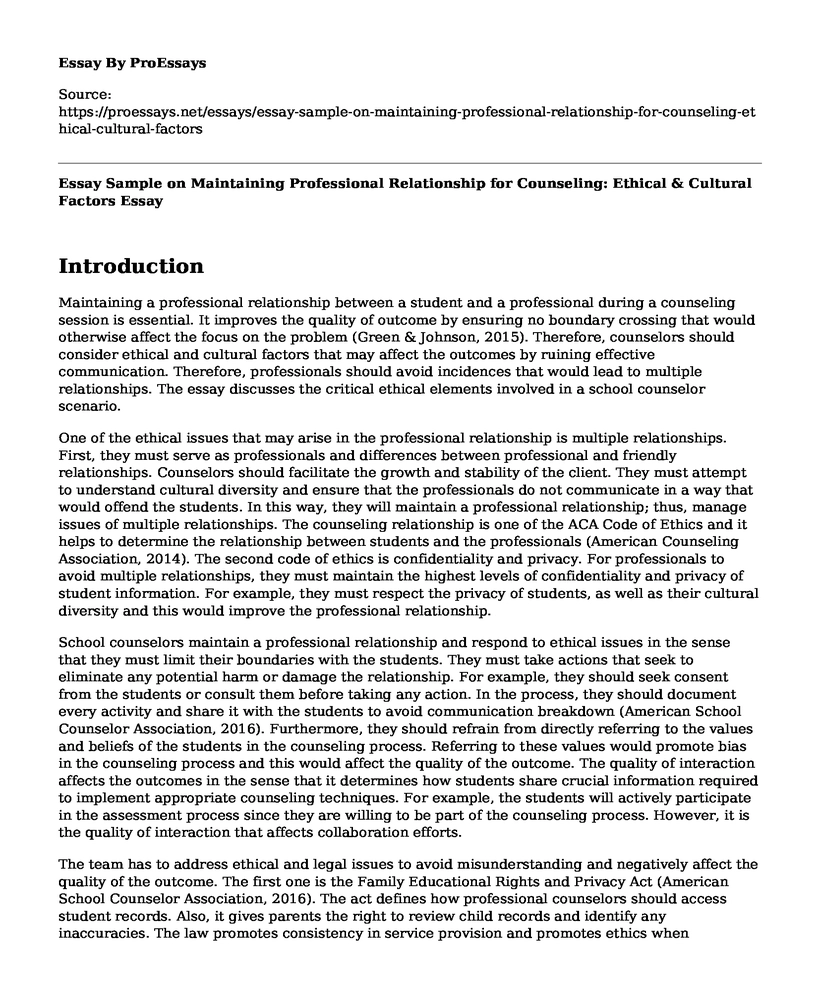Introduction
Maintaining a professional relationship between a student and a professional during a counseling session is essential. It improves the quality of outcome by ensuring no boundary crossing that would otherwise affect the focus on the problem (Green & Johnson, 2015). Therefore, counselors should consider ethical and cultural factors that may affect the outcomes by ruining effective communication. Therefore, professionals should avoid incidences that would lead to multiple relationships. The essay discusses the critical ethical elements involved in a school counselor scenario.
One of the ethical issues that may arise in the professional relationship is multiple relationships. First, they must serve as professionals and differences between professional and friendly relationships. Counselors should facilitate the growth and stability of the client. They must attempt to understand cultural diversity and ensure that the professionals do not communicate in a way that would offend the students. In this way, they will maintain a professional relationship; thus, manage issues of multiple relationships. The counseling relationship is one of the ACA Code of Ethics and it helps to determine the relationship between students and the professionals (American Counseling Association, 2014). The second code of ethics is confidentiality and privacy. For professionals to avoid multiple relationships, they must maintain the highest levels of confidentiality and privacy of student information. For example, they must respect the privacy of students, as well as their cultural diversity and this would improve the professional relationship.
School counselors maintain a professional relationship and respond to ethical issues in the sense that they must limit their boundaries with the students. They must take actions that seek to eliminate any potential harm or damage the relationship. For example, they should seek consent from the students or consult them before taking any action. In the process, they should document every activity and share it with the students to avoid communication breakdown (American School Counselor Association, 2016). Furthermore, they should refrain from directly referring to the values and beliefs of the students in the counseling process. Referring to these values would promote bias in the counseling process and this would affect the quality of the outcome. The quality of interaction affects the outcomes in the sense that it determines how students share crucial information required to implement appropriate counseling techniques. For example, the students will actively participate in the assessment process since they are willing to be part of the counseling process. However, it is the quality of interaction that affects collaboration efforts.
The team has to address ethical and legal issues to avoid misunderstanding and negatively affect the quality of the outcome. The first one is the Family Educational Rights and Privacy Act (American School Counselor Association, 2016). The act defines how professional counselors should access student records. Also, it gives parents the right to review child records and identify any inaccuracies. The law promotes consistency in service provision and promotes ethics when delivering services (American School Counselor Association, 2016). Secondly, it improves the assessment and interpretation of the findings; thus, it contributes to positive outcomes. Secondly, the California Consumer Privacy Act protects the interests of clients in the counseling process. It is also related to data protection. Professionals should consider ethical practices, such as the privacy and engagement of relevant stakeholders.
The counselor in the scenario will collaborate with other professionals to deliver quality services. For example, they must work together with nurses to provide medication when it is needed to manage identified conditions, such as depression (Green & Johnson, 2015). Secondly, the counselor should work together with therapists to offer the appropriate services required to stabilize the condition of the client. The purpose is to coordinate various services and improve the quality of service provision. Additionally, professional health counselors play an essential role in providing supportive services, aiming to manage the emotional effects of psychological processes. Also, they coordinate treatment strategies for effective psychological functioning, as well as the referral process.
Among the institutional factors affecting the professional relationship among counselors includes organizational structure. Some professionals may consider themselves superior to others and this would cause internal conflicts (Green & Johnson, 2015). For example, one counselor may see another as an outsider affecting the working relationship; thus, damaging the relationship. The other barrier is the dispute solution process. Since conflict is inevitable in any workplace, a lack of effective dispute management process can be a barrier to the management process. Therefore, professionals must take into account these factors to avoid misunderstanding.
Conclusion
Counselors face challenges in their places of work, such as multiple relationships. They develop strategies that would enhance teamwork and improve the outcomes. They should apply ethical and legal practices so that they do not offend students. Institutional barriers that may affect the working relationship include organizational structure and dispute solution process. Therefore, professionals must adhere to professional ethics.
References
Green, B. N., & Johnson, C. D. (2015). Inter-professional collaboration in research, education, and clinical practice: working together for a better future. The Journal of Chiropractic Education, 29(1), 1-10.
American School Counselor Association. (2016). ASCA Ethical Standards for School Counselors. New York: ASCA.
American Counseling Association. (2014). 2014 ACA Code of Ethics. Washington: American Counseling Association.
Cite this page
Essay Sample on Maintaining Professional Relationship for Counseling: Ethical & Cultural Factors. (2023, Mar 26). Retrieved from https://proessays.net/essays/essay-sample-on-maintaining-professional-relationship-for-counseling-ethical-cultural-factors
If you are the original author of this essay and no longer wish to have it published on the ProEssays website, please click below to request its removal:
- Administration Assistant Position Cover Letter Example
- Application for Full Prescriptive Authority
- Reasons for Banning Energy Drinks Essay Example
- Paper Example on Teacher Self-Awareness: Examining Strengths, Weaknesses & More
- Essay Sample on Motivating Employees for Longer Organizational Life
- Paper Example on Young and Driven: The Nursing Career Path
- Essay Example on Employee Relations @ McDonald's: A Conducive Work Environment







